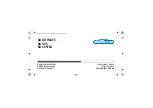
18
5.4
Operation
Carry out blasting in parallel tracks in such way that the dust hose and electric cable do not become twisted.
The next figure shows the recommended blast cleaning paths leading away from the dust collector.
Make sure that no vehicles, such as forklift trucks and other equipment run over the electric cable and the dust
hose.
The selection of the correct advancing speed of the blast machine is important for a good blast cleaning result.
In the case that the surface has different characteristics (e.g. different hardness or different coating
thicknesses), a uniform blast result can be achieved by varying the advancing speed during blast cleaning.
The advancing speed depends on the material of the surface to be treated and the desired profiling.
The correct advancing speed can be found out by observing the blasted surface and varying the speed during
the blast cleaning process.
Slight profiling on concrete requires a higher speed than coarse profiling (6 - 10).
Blasting on steel requires a very low advancing speed (0 -2).
Check the separator tray every 3 hours for foreign matter and large contaminants.
5.5
Switching off the machine
Close the abrasive valves.
Press the red button “Blast motor OFF”
Switch the main switch to position “OFF”
Pull out the connector of the main power supply of the machine.
Switch off the filter unit.
Wait for standstill of all drives before any inspection or maintenance works are started.
1
Dust collector
2
Dust hose and
electric cable
3
Blast cleaning machine
When the blast head is lifted from the floor, abrasive escapes from
the sides of the blast head at high speed! If the machine is moved
with the blast head raised, the abrasive magnetic valves must be
closed!
Alter the direction only after closing the magnetic valves!















































